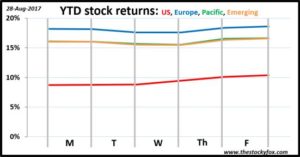Similar to the last two weeks, this week is dominated by a social (and weather) story. Before it was the Google memo and then the unrest in Charlottesville; now it’s Harvey in Houston. The difference as it relates to this blog is that the impact Harvey is having on Houston also has some major implications for the financial markets.
In the end, curiously, the markets had a steady climb this week, rising almost 2% in the US and almost 1% for the other global markets. What gives?
Obviously, Harvey has dominated the headlines. The hurricane pummeled Houston, putting it under several feet of water. It has been a human tragedy that we have all seen on television, but in a way it’s oddly encouraging.
Houston is the 4th largest city in the country and it has just suffered a massive body blow. As bad as it is: 1) There is no doubt that Houston will recover and after a bit of time (probably much less than most would expect) the city will be back to normal. 2) The rest of the country has been cranking along just fine.
From a financial and investing perspective, that means we’ll feel a bit of a blip as Houston gets knocked down and then gets back to it’s feet, but it should be short and shallow, and then after not too long it will be like it never happened. That’s truly a testament to the amazing diversity and robustness of our economy.
Outside of Houston, the rest of us are feeling Harvey’s impact at the pump. About 20% of all gasoline is refined in the area impacted by the hurricane. Here in Greensboro, that has caused gas prices to jump from about $2.19 to $2.59.
This won’t last very long, as those refineries are going to be back online soon, but in the meantime, it will have an impact. This is a bit of a bummer, because the extra we are all paying for gas really isn’t going to anyone. People aren’t getting higher profits that they can spend or anything like that. One way to think of it is that extra money it’s being “swallowed up” by the closed refineries.
That’s what economists call a dead-weight loss, and it’s never good. Fortunately, it will be over soon.
Harvey’s destruction has obviously caused a lot of damage, in homes and businesses. The one that has hit the news is the peroxide plant which lost power and then blew up. Obviously that one instance is going to cost millions of dollars to repair.
The total tab for Harvey’s destruction is expected to come in at about $190 billion. That’s a tremendous amount of money, about the total GDP of an entire country like Greece. However, for the US that’s a bit of a drop in the bucket. That will come to about 1% of our nation’s GDP. One way to think of it is that every American will need to pony up about 1% this year to pay for Harvey’s damage. That’s a lot but definitely doable.
US revising GDP growth upwards
With all that damage from Harvey, how are stocks up so much?
The economy is strong, innovation is happening, and things are just plugging along. In fact, the economy just clocked in a 3% growth rate. In the past several years it has been pretty volatile but averaging more in the 2% range.
If this 3% growth becomes sustainable that’s a huge deal. That extra 1% pays for Harvey’s damage by itself. That extra 1% is a will really turbo boost the stock market. I think the optimism for that is keeping things at record levels.
So there you have it. With the dominate story being bad news, stocks were up, and that’s really a testament to how strong things are for the stock market right now.
